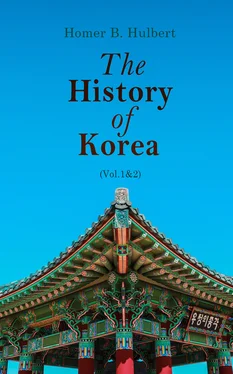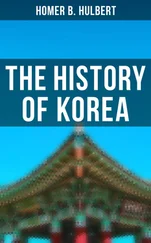The king caused the erection of great store-houses in the various parts of the country for the storage of rice to be used in time of famine. The students in the Confucian school were encouraged by gifts of clothes and food, and several were sent to China to prosecute their studies. In 987 the soldiers’ implements of war were beaten into agricultural implements, especially in the country districts. A second trial was made of liberating slaves but without satisfactory results. It made those that were not freed so arrogant that the attempt was given up. A further invasion was made into the territory of priest-craft by the discontinuance of certain important festivals, but the fact that the law against the killing of any animal in the first, fifth or ninth moons was still in active force shows that Buddhism was still a powerful factor in the national life. Kyöng-ju, the ancient capital of Sil-la, was made the eastern capital of the kingdom, a merely honorary distinction.
The annals state that this reign beheld the inauguration of the humane custom of remitting the revenues, in part or in whole, in times of famine, also the custom of the king sending medicine to courtiers who might be ill.
The growing power of Kitan in the north was a cause of uneasiness for we find that in 989 the whole north-east border was thoroughly garrisoned. The time was approaching when this half-savage tribe would add another proof that conquest is usually from the cooler to the warmer climate.
During the commotion incident upon the founding of the dynasty and the extinction of the kingdom of Sil-la, the bureau of history had been largely neglected. Now it was reorganized and the annals of the kingdom were put in proper shape.
The king was apparently trying to steer a middle course between Buddhism and Confucianism, for the pen of the annalist records that no animals were to be killed on the king’s birthday, and in the next stroke that wives were to be rewarded for unusual virtue, and again that the king went out of the city to meet an envoy bringing the great Buddhistic work, Tă-jang-gyŭng, from China, and still again that the first ancestral temple was erected. Well would it have been could this equilibrium have been maintained.
One of the sons of Wang-gön was still living. His name was Uk. He was the author of a court scandal which illustrates the lax morals of the time. He formed a liaison with the widow of his younger brother. The king learned of it and visited his anger upon the offender by banishing him. The woman bore a son and then went forth and hanged herself on a willow tree. The nurse brought up the child and taught it the word father. One day the child was brought into the presence of the king, when it rushed forward, caught the king by the garments and cried father. The king was deeply moved and sent the child to its father in banishment. When Uk died the boy was brought back to the capital and given office. He eventually became king.
In 993 the cloud in the north began to assume a threatening aspect. A feeble attempt was made to stem the march of the now powerful Kitan tribe, but without avail. The Kitan general, So Son-ryŭng, made this a casus belli , and, mustering a strong force, pushed down into Koryŭ territory. The king put Gen. Păk Yang-yu at the head of the Koryŭ forces and himself went with the army as far as P‘yŭng-yang. At that point news came that the enemy was going around the flank and had already taken one important fortress there. The king hurried back to Song-do. Gen. So Son-ryŭng sent a curt message saying “Ko-gu-ryŭ once belonged to Kitan. We have come to claim only our own. It remains therefore only for you to surrender and become our vassals.” In answer the king sent Yi Mong-jun to negotiate a peace on the best possible terms. Arriving at the camp of Gen. So he boldly demanded why the northern tribe had presumed to break across the boundary. Gen. So replied that the land was the property of his master and the sooner the king acknowledged it and accepted Kitan as his suzerain the better for all parties. The envoy returned to the capital and a great council of war was held. Some advised to surrender, but some said “Offer them all the territory north of the Tă-dong River as a compromise measure.” The king chose the latter alternative and began by having the people there throw into the river all grain that they could not carry away, so that it might not fall into the hands of the enemy. The Kitan general was highly pleased with this concession but his pride had a fall when, a few days later, he was defeated by the Koryŭ forces under Gen. Yu Bang. Thereupon he modified his demands to the mere recognition of the suzerainty of Kitan; but this the king was unwilling, under the circumstances, to agree to. Gen. So was not satisfied with the grade of the general sent to negotiate the treaty and demanded that the prime minister of Koryŭ be sent to do it. A high official was therefore sent but he refused to bow before the Kitan general. The latter said, “You are from Sil-la and we are from Ko-gu-ryŭ. You are trespassing on our territory. We are your neighbors. Why do you persist in sending envoys to the court of China? That is the reason we are now at war with you. Restore our land, become our vassals and all will go well.” The envoy refused to agree to this. He said “We are Ko-gu-ryŭ people. How else could our land be Koryŭ? The capital of Ko-gu-ryŭ was at P‘yŭng-yang and you formed a small part of that kingdom; so why do you claim that we have usurped the power? Our territory extended far beyond the Yalu River, but the Yŭ-jin people stole it from us. You had better first go and recover that part of Ko-gu-ryŭ which the Yŭ-jin stole and then we will gladly bow to you as suzerain.” What there was in this argument that convinced the hardy warrior of the north we cannot say, but it served its purpose, for he first spread a great feast and afterwards broke camp and marched back to his own country without obtaining the coveted surrender. The king, in order to maintain the semblance of good faith, adopted the Kitan calendar. The next step, however, showed the true bent of his mind, for he sent a swift messenger to the court of China with an urgent request for aid against the arrogant people of the north. But the Sung emperor apparently thought he had his own hands full in watching his own borders and declined to send the aid requested. This put an end to the friendship between Koryŭ and the Chinese court, and all communication was broken off. The king of Kitan sent a commissioner to Koryŭ to look after his interests there and when he returned to the north he took a large number of women as a gift from the Koryŭ king to his master.
It was now, near the end of the tenth century, that Koryŭ was first regularly divided into provinces. There were ten of them. Their names and positions were as follows. Kwan-nă, the present Kyŭng-geui; Chung-wŭn, now Chung-ju; Ha-nam, now Kong-ju; Yong-nam, now Sang-ju; Kang-nam, now Chŭn-ju; San-nam, now Chin-ju; Hă-yang, now Na-ju; Sak-pang, now Ch‘un-ch‘ŭn, Kang-neung and An-byŭn; P‘ă-su, now P‘yŭng-yang; and Kă-sŭng, another name for Song-do. These were rather the provincial centers than the provinces themselves.
In pursuance of the policy adopted in reference to the kingdom of Kitan, ten boys were sent northward to that country to learn its language and marry among its people. The final act of suzerainty was played when in 996 the “emperor” of Kitan invested the king of Koryŭ with the royal insignia. The end of the reign was approaching, but before it was reached one of the most important events of that century transpired. It occupies little space on the page of history. Many a court intrigue or senseless pageant bulks larger in the annals, but it was one of the most far-reaching in its effects. It was the first coining of money. It was in this same year, 996. These coins were of iron but without the hole which so generally characterizes the “cash” of to-day.
Читать дальше












